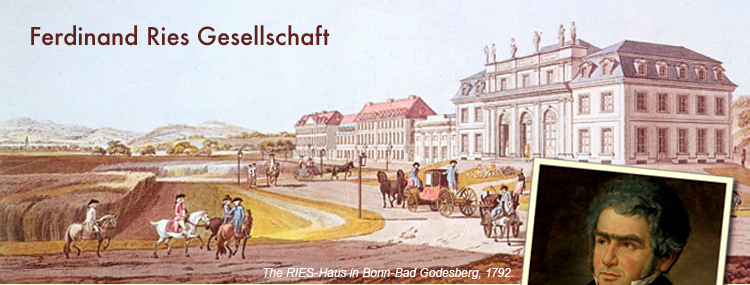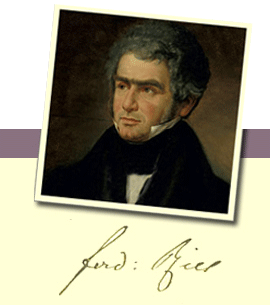Biography - Vienna
When sixteen-year-old Ferdinand arrived on Beethoven’s doorstep in Vienna in 1801 with a letter of recommendation from his father, Beethoven was already at the peak of his fame. As he had been aided in every respect by his violin teacher Franz Anton Ries during a very difficult period of his life following the death of his mother, Beethoven welcomed his fellow countryman with open arms and gladly took him on as his piano pupil. In return, Ferdinand dealt with Beethoven’s correspondence with publishers, copied Beethoven’s scores and carried out minor personal commissions. For lessons in composition, Beethoven sent Ferdinand to his own former teacher, Johann Georg Albrechtsberger.
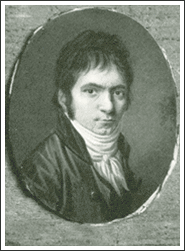 It was in his capacity as Beethoven’s pupil and interpreter that Ferdinand Ries made his first public appearance as a pianist in Vienna on 1st August 1804. Performing in Vienna’s baroque Augarten, he played Beethoven’s Piano Concerto No. 3 (Op. 37) with a cadenza all his own. It was in his capacity as Beethoven’s pupil and interpreter that Ferdinand Ries made his first public appearance as a pianist in Vienna on 1st August 1804. Performing in Vienna’s baroque Augarten, he played Beethoven’s Piano Concerto No. 3 (Op. 37) with a cadenza all his own.
Ries lived for several years in Vienna, moving in what must have been the most interesting of circles for a young musician. He made the acquaintance of the most famous composers of his time: Antonio Salieri and the now ageing Joseph Haydn, to whom he dedicated his piano sonatas (Op. 11), as well as countless virtuosos who, breaking their journeys in Vienna, would perform at the city residences of music-loving aristocrats – Lichnowsky, Kinsky, Fries, Lobkowitz, to name but a few. Beethoven obtained a position for Ries with Count Browne as a pianist.
Ferdinand Ries would have liked to have remained in Vienna under such fortunate circumstances, but the political situation dictated otherwise. As a citizen of the occupied Rhineland, Ries was ordered by the French authorities in November 1805 to report at the recruiting station in Koblenz; however an illness he had suffered in his youth now turned out to be a blessing in disguise, for he was declared unfit for military service. It was from Koblenz that he then returned to his parental home, to the now secularized Marienforst Cloister near Bonn. His father had purchased part of the cloister’s land in 1802 in order to farm it and feed his family.
Ries then worked in Bonn for a whole year as a pianist, composer and piano teacher. For the music publisher Nikolaus Simrock (1751-1832), a former waldhorn player with the electoral court orchestra and a colleague and friend of his father’s, Ries transposed Beethoven’s string trios and quartets into piano trios. Simrock also printed Ries’s Op. 1, the “Deux Sonates pour le Piano-Forte”, which he had dedicated to Beethoven. It was during this period that he devoted himself primarily to the composing of piano and chamber music, including his first piano concerto, though this was not published until 1824. Early in 1807 Ries travelled to Paris, the city that Beethoven had recommended for him as a young musician in 1801. Here he dedicated himself to composing a number of chamber music works, including his later successful Septet, Op. 25. However, piano music was little appreciated in France at this time. Therefore, he was unable to achieve success as a piano virtuoso or gain a foothold on the
Paris music market. In the summer of 1808 he decided to return to the musical circles of Vienna.
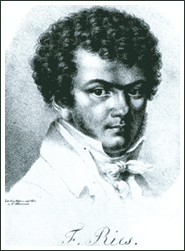 After two years in Paris (1806-1808), which were not particularly successful but had nevertheless been extremely busy and had brought forth approximately 25 works (including his Grand Septuor Op. 25), Ferdinand Ries returned to Vienna in the summer of 1808. In the meantime, however, the music scene in Vienna had undergone a drastic change. It was now, as he wrote to Simrock, “a ghastly musical period”. Even the large and important families were now tightening their belts, and so much so that it was difficult for the young man to earn a living and at the same time to make any progress in his music. Ries’s second stay in Vienna was of short duration, not least because the Austrians were now threatening to conscript him in the face of the imminent attack by Napoleon’s army. In July 1809 he left Vienna for good and returned home. Meanwhile his father had given fresh impetus to the Bonn music scene with his “Bonn Winter Concerts”. Father and son now made joint appearances in concerts in Bonn and Cologne. It was during this time, too, that Ferdinand Ries composed his first symphony, a further piano concerto and his only violin concerto, the latter having certainly been composed for – and possibly in collaboration with – his father. Its first ever performance was given by his father in a large concert on 15th December 1810 as part of a special Ries programme in Bonn. After two years in Paris (1806-1808), which were not particularly successful but had nevertheless been extremely busy and had brought forth approximately 25 works (including his Grand Septuor Op. 25), Ferdinand Ries returned to Vienna in the summer of 1808. In the meantime, however, the music scene in Vienna had undergone a drastic change. It was now, as he wrote to Simrock, “a ghastly musical period”. Even the large and important families were now tightening their belts, and so much so that it was difficult for the young man to earn a living and at the same time to make any progress in his music. Ries’s second stay in Vienna was of short duration, not least because the Austrians were now threatening to conscript him in the face of the imminent attack by Napoleon’s army. In July 1809 he left Vienna for good and returned home. Meanwhile his father had given fresh impetus to the Bonn music scene with his “Bonn Winter Concerts”. Father and son now made joint appearances in concerts in Bonn and Cologne. It was during this time, too, that Ferdinand Ries composed his first symphony, a further piano concerto and his only violin concerto, the latter having certainly been composed for – and possibly in collaboration with – his father. Its first ever performance was given by his father in a large concert on 15th December 1810 as part of a special Ries programme in Bonn.
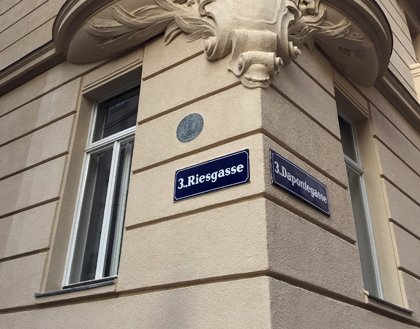
|
|
|
